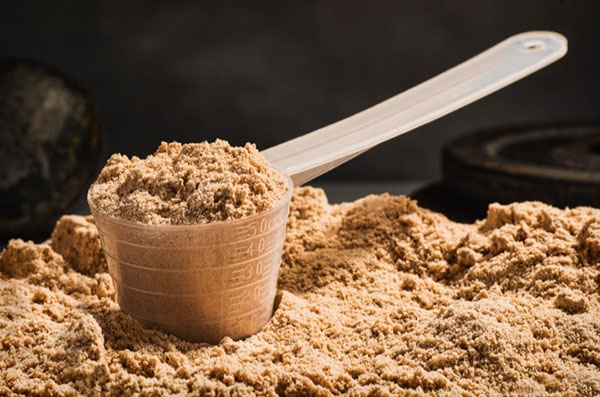Eating has become an overwhelmingly involved practice these days. From determining whether or not we should avoid gluten, dairy, red meat, and salt, to secret ingredients that promise to change your life, it’s hard to keep up with the latest trends—not to mention adapt our plates to them.
If you’ve left your house any time recently, passed a hydrating soccer team or a grocery store, you’ll have no doubt seen or heard of BCAAs, or Branched-Chain Amino Acids. What the hell are these things supposed to be and do anyway? Why are we spending $40 or more on them? Do they actually work? Here’s your primer, and how to determine whether this new, market fad is one you may benefit from.
BCAAs are a type of amino acid that make up a large portion of your muscle mass (about 35%). They are essential, meaning we cannot manufacture them ourselves but must actually consume them. Basically, they’re protein.
Based on the unique way these proteins are metabolized, scientists in white coats have been feeding them to lab rats for a long time to observe both their benefits and shortcomings in everything from cognition to starvation to glucose metabolism.
If you are a weight lifter, someone has been trying to sell you these for years. Studies are showing that consuming these proteins during and subsequent to training can increase the effectiveness of the workout and improve recovery.
Some of the most promising studies show that consuming BCAAs after working out reduces muscle soreness significantly. A double-blind study even reported an impressive 80% reduction in perceived soreness. Other studies demonstrate that consuming BCAAs with the intention of increasing muscle mass was more effective than using other protein supplementation, such as whey. Some suggest they aid in a reduction of fatigue and increased endurance in long distance runners.

Reading these few lines is almost enough to send us all running to GNC for the latest and greatest. I can work out harder and hurt less? Then I want to buy 1,000 bottles!!! Hold onto your pocket book.
While some suggest we’re all deficient in amino acids, studies also tell us that if we are eating enough dietary protein, we are likely not deficient in these essential amino acids. The question is then, are we are asking our bodies to do inordinate things that require inordinate supplies of BCAA? Probably.
Other studies show us that excessive supplementation of BCAA can possibly trigger or cause ALS like symptoms (there’s a bucket of cold water to throw on a good idea), increase ammonia in the blood (this causes fatigue), and decrease the absorption of other important proteins. Once again, we learn that you can get too much of a good thing.
Furthermore, studies of individuals tinkering with a ketogenic diet found that rather than supporting glucose sensitivity, elevations in BCAAs in the blood stream correlated to a reduction in lean muscle mass. So while taking them on a calorie-restricted diet for body mass optimization may be effective, a super low-carb human may get the opposite results.
So if we were going to buy into this latest fad, perhaps it would behoove us to consider what kind of dosing might be appropriate to our unique needs. More is not necessarily better.
However, finding the right dose can be challenging. There is not enough research out there for us to determine precisely how many grams per pound of body weight we might benefit from. And, because all of our diets are unique, making a general recommendation is, well, not recommended.
But now it’s confession time: I eat a ridiculous amount of dead animal, and I take BCAA before and after my workouts when I remember. The nutritionist in me says: Try them if you’re curious. Take the standard dose on the product you source, and see how you feel. The athletes in my practice are hooked and making super hero claims. Or at least they feel well enough to keep going back to the gym. Whether placebo or real, that’s a great side effect. //
Nerding Out on Branched-Chain Amino Acids
For those who want to dig a bit deeper, here are the BCAA-related studies that Ammi referenced:
- Falavigna, G. et al. (2012)
- Guano, A.B. et al. (2011)
- Manuel, M. and Heckman, C.J. (2011)
- Shimomura, Y. et al. (2010)
- Stoppani, J. et al. (2009) //
Ammi Midstokke lives in Sandpoint, ID, where she raises her daughter on a deeply-ingrained fear of gluten and an arguably-dangerous appetite for adventure. Her Eatology column appears in every issue of Out There.












